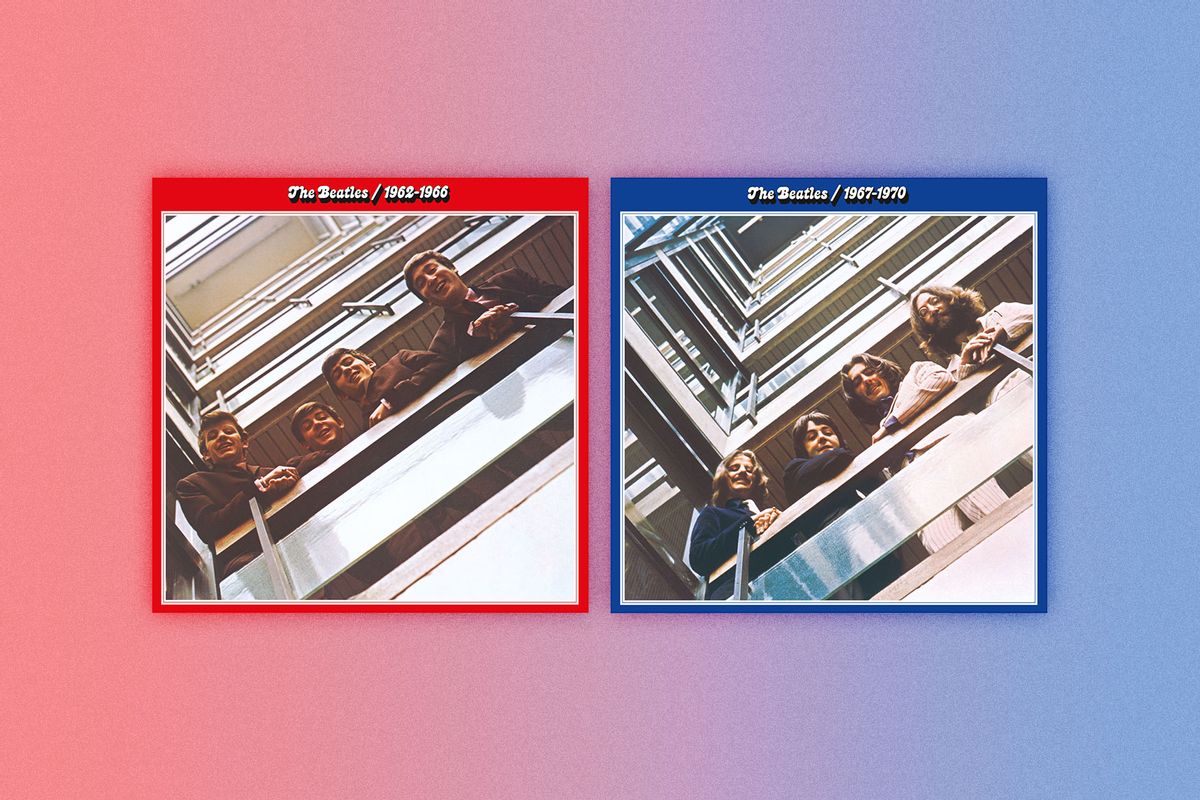The so-called “Red” and “Blue” albums — the Beatles compilations that generation after generation have grown up with — just got a whole lot better. Thanks to Peter Jackson’s MAL technology, the tracks shimmer and pop like never before.
Originally released in 1973 – as "The Beatles, 1962-1966" and "The Beatles, 1967-1970," respectively – the "Red" and "Blue" albums came into being as a result of the unauthorized release of "The Beatles: Alpha Omega" in 1972. "Alpha Omega" was an illegal compilation of 60 tracks by a New Jersey outfit called Audiotape, Inc., who brazenly advertised the illicit four-record set on radio and TV.
Apple Records famously put out the "Red" and "Blue" albums in response to the "Alpha Omega" episode. In so doing, they established one of the Beatles’ evergreen releases — two double albums’ worth of standout songs via which multiple generations have discovered the Fabs’ timeless music. The LPs made their maiden voyage on CD in 1993, followed by a bravura remaster in 2010.
But nothing compares to the spectacular new versions of the "Red" and the "Blue" albums made possible, in large part, to filmmaker Peter Jackson’s MAL technology. A machine-learning neural network dubbed MAL in homage to the Beatles’ beloved roadie Mal Evans, the technology provides the capability for separating audio tracks into their component parts.
The result is breathtaking, as listeners discovered last month during a playback session in New York City’s Dolby Theatre. Attendees listened with a sense of awe as new mixes of “Ticket to Ride” and “I Am the Walrus” came roaring to life with previously unrealized dimensions in the Dolby Theatre. But those tracks were only the beginning.
Thanks to Jackson’s MAL technology, music lovers will enjoy sizzling remixes of the songs on the "Red" and the "Blue" LPs, as well as the addition of several new tunes to round out the collections. The albums are chockful of aural surprises. By disaggregating the sounds, the remixes succeed in allowing listeners to hear previously unrealized vistas of the recordings. Take “I Saw Her Standing There,” for example, for which the sound of all four Beatles playing their hearts out can be heard in splendid isolation, all working in the stead of a time-eclipsing song. And then there’s the remix of “A Hard Day’s Night,” in which John Lennon’s Jumbo acoustic guitar sparkles like never before.
Want a daily wrap-up of all the news and commentary Salon has to offer? Subscribe to our morning newsletter, Crash Course.
But it doesn’t end there. Latter Beatles-era tracks on the "Blue" album are equally revelatory, such as the remixes of the "Magical Mystery Tour" songs. And then there’s “Hey Bulldog,” which offers a marked improvement over the muddy "Yellow Submarine Songtrack" version released in 1999. In its MAL-enhanced form, the song provides a searing example of the Beatles as a high-octane rock ‘n’ roll band.
With “Now and Then” trumpeting Beatlemania for the new millennium, the "Red" and the "Blue" albums’ makeovers couldn’t come at a better time. The LPs that have long existed as the gateway for new Beatles fans are poised to take the Fab Four’s incomparable legacy to even greater heights.
"The Beatles 1962-1966" (Red Album) and "The Beatles 1967-1970" (Blue Album) 2023 editions have been released as of Nov. 10.
Read more
Beatles stories by Kenneth Womack



Shares